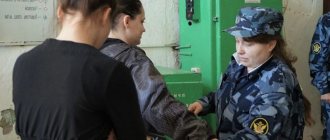Why and why women are imprisoned
Criminal behavior is a social construct that develops in a certain historical and cultural environment. Society normalizes male crime more than female crime. There are approximately five times fewer women prisoners than men. Of course, both of them look like something that violates the social order. I make quotation marks with my hands, because for a man it still looks like a continuation of a masculine, somewhat cruel and aggressive beginning. And women in patriarchal regimes are credited with weakness, softness, and pliability. It is clear that these are all stereotypes, but they really influence society.
Women prisoners do not necessarily have dysfunctional parents, but may have special situations related to alcohol, drugs, divorce, or a new cohabitation mother or father. One way or another, there is an emphasis on relationships with the mother - they can be very complex.
Nowadays it is mostly women who are imprisoned for drugs. We were told stories about so-called test purchases. This is a common way to get out of a difficult situation using law enforcement agencies. Many crimes are related to domestic violence. Very often this is a response to violence from a man: father, stepfather, cohabitant, partner, husband. We were often told about events at school that became a sharp turn in the lives of women. As a rule, this is associated with violence, sometimes rape, some kind of injustice. As a result, circumstances developed in such a way that the person could not resist them and committed a crime. We have not encountered any situations with deliberate aggression or a desire to injure someone.
Recently, cases of economic crimes have become more frequent. After the protest events - speeches, rallies, arrests - the range of crimes and punishments expanded, we know about cases of detention and sentences for participation in protests. In no way do I undertake to judge or interpret issues related to the legality or illegality of such detentions and terms. I’m just noting that this is a new phenomenon for Russia. The Pussy Riot story gave impetus to special attention to cases of protest activism, especially women's. And of course - to the conditions of detention of women in colonies and special regimes and the everyday life of women on the verge of physical survival and psychological pressure. True, in my opinion, there were no fundamental changes in the colonies after this. Except that a year and a half ago there was a large-scale trial with the top of the Federal Penitentiary Service regarding corruption and abuse. If any changes occur in the system, they are of a political nature.
Photo: Ilya Pitalev / RIA Novosti
“They communicate with you as long as you have something to share”
Olga was transferred to correctional colony No. 6, which is located in the Oryol region. “At that time, our colony was exemplary; television crews came there periodically, so in terms of living conditions, life was tolerable. But only if there are no serious health problems—medical care in the zone is poor,” she recalls.
Olga immediately set herself the goal of getting out on parole. At first it was very difficult for her to live according to the regime. Getting up at six in the morning, “if the duty officer comes in and you’re still lying down, they’ll write a report on you - and goodbye to parole,” exercise at 6:15, then breakfast, at 7:30 - line-up and departure to work - sewing production.
The shift lasted eight hours, but Olga tried and could work for 24 hours.
She earned, according to her, about 20 thousand in cash - she spent it mainly on cigarettes and Rollton. Among the prisoners there were also those who received literally 10 rubles a month: they came to sewing - it was impossible not to come - but did not work. “It is important to the administration that prisoners meet and exceed the plan,” she explains. — Previously, we sewed 6,000 sets of clothes a month (now, as far as I know, they can’t sew 1,000). If the team sees that you are working and trying, they will support you, but if you send everyone and don’t want to work, they will oppress you. Nobody wants problems, everyone wants to get out on parole.” In 2013, Pussy Riot member Nadezhda Tolokonnikova, serving a sentence in IK-14 in Mordovia, wrote an open letter in which she spoke about the abuse and slave labor of women in the colony. However, a criminal case about abuses in the Mordovian colony was opened only five years later - in 2018. In July 2021, the court sentenced the former acting
the head of the colony, Yuri Kupriyanov, to two years probation for exceeding official powers. Olga recalls that in the colony women always tried to take care of themselves: “Sometimes you just put on makeup to spite the guards on duty, who look down on you. All prisoners are given sizeless clothes. We tried to fit him according to his figure.” This violation is subject to a report, but the administration punished only for an excessively shortened skirt.
“The women’s colony is essentially a big chicken coop. I couldn't find real friends there. The women there “have a family life,” that is, they share food and cigarettes, which they receive from the outside in parcels. But I don’t like this bag system, because they communicate with you as long as you have something to share. For example, a mother constantly brought parcels for one girl. They were friends with her. When my mother died, all the “friends” turned away because they realized that there was nothing more to take from her.”
There were also romances between women in the colony, but there were few strong couples. “I saw enough for the first two years: today - with one, tomorrow - with another, they come together, then they separate, and when they are released, they forget all their vows, find men and give birth to them,” says Olga. There were also fights out of jealousy, but rarely. The convicts were quickly separated - otherwise, report, you won’t be released early.
In 2014, Natalya came to the colony. They were in different squads, but sat opposite each other while working. We just talked for six months, “and then things started to happen.” Now they have been together for six years. Natalya was released on parole a week earlier than Olga.
Same-sex sex is prohibited in the zone ( According to
Article 116 of the Penal Code of the Russian Federation , “lesbianism” is a malicious violation - “Utopia.”
). If they catch you, they can put you in a punishment cell and write a report - then you definitely won’t be released on parole. But, according to Olga, when the administration sees that the couple does not scandal, does not sort things out and, most importantly, works well, they turn a blind eye to this. “Natasha and I were in different detachments and sometimes during the day we came to each other, curtained the two-tiered curtain wall on all sides with sheets, and... We tried to do everything quietly and quickly, so as not to catch the eye of the duty officer and the head of the detachment.” Such openness did not bother Olga: for the first couple of years she slept on the second tier, above the married couple.
“In a colony you are constantly visible. I really lack personal space. The only thing you dream about is to be alone. For three years you are still somehow holding on. Then you get tired, become aggressive, lose your temper, and ask them not to come near you again,” she recalls. “Since there was no physical opportunity to be alone, I simply retreated into myself.” The woman’s outlet was the club at the colony, where she went to sing: “I wouldn’t have survived without music.” Olga even ended up in a news story on a local TV channel. A few years later, she was appointed head of the club and transferred to a lightweight squad. There, instead of two-tier bunks, there are single-tier bunks, a larger rest room, a spacious kitchen with a microwave, a washing machine and a shower for the squad (instead of a common bathhouse) - that is, the conditions are much more comfortable.
Illustrations: Nastya Krzysztof/Utopia
Olga first applied for parole after five and a half years in prison. She says that she tried very hard, she had no violations, only one single reprimand for not meeting production standards - and that was not her fault. But the girl was denied parole, and this was a strong blow for her. I realized that if you sew very well, you won’t get parole: it’s not profitable for the administration to release good seamstresses ahead of schedule. After this, Olga “stopped trying and lived as she wanted until the end of her sentence.”
The body of a condemned woman. Medicine, obstetrics, hygiene
In the codes and practices regulating detention in pre-trial detention centers and colonies, there is no understanding of the differences between women and men. On the one hand, a woman who is imprisoned is subjected to greater stigmatization in public opinion - as having violated not only the law, but also violated the “natural” order of women’s destiny. On the other hand, within the framework of the punishment system, she is denied the realization of her “femininity”, when her body, physiology, and special practices turn out to be completely insignificant; rather, on the contrary, they serve as a kind of additional mechanism of humiliation and punishment for a “double” crime. The maintenance of a woman is no different from the maintenance of a man. At least nowhere are rules written down that take into account the peculiarities of female physiology. The gender of the criminal is not important.
Medicine in the colonies is of an extremely low level. The biggest problem is teeth. Women told us that they recognized each other on the street, without having shared prison experience, because ordinary people simply do not have such bad teeth. If teeth hurt, they are very rarely treated. Usually they are torn.
Gynecology is perceived as an additional punishment for women, as a reminder of how unworthy a woman is. Help is very bad. Women are brought to an extreme state where hospitalization is already necessary. Doctors work in the best traditions of Soviet gynecology, when certain manipulations with the female body can be used and perceived as a special punishment for “pleasure.” This is repressive medicine.
Drug addiction is treated simply by quitting. For a person who wants to get rid of it, the conditions there are suitable - complete isolation. These are, of course, terrible withdrawal symptoms, but women told us that getting rid of addiction is the only advantage of imprisonment, no matter how strange it may sound. Of course, you can buy drugs in colonies, but they are not available to everyone. This is a question of money, connections, relations with the administration and place in the hierarchy.
There are no medical secrets observed there. If a prisoner has HIV or tuberculosis, everyone probably knows about it. For example, HIV-positive people must be transported separately. There is a slight HIV-phobia there, because people are disconnected from up-to-date medical information. Certain fears exist.
We were told stories of women giving birth in the colony. There are special compartments or barracks for pregnant women. After giving birth, they spend a short time with the children, and then the babies are separated. I know that this is a very difficult and traumatic situation for women, because there is not much time allocated to be with the child. Children may be desired, but sometimes it’s the other way around - some get pregnant on purpose to get relaxation of the regime.
The colony store sells sanitary pads, and the woman must buy them herself. This is also a valuable resource. They are exchanged for something, sometimes improvised means are used instead. The worst bullying is when bed linen gets dirty due to menstruation, and women are forced to wash it themselves. This is often unbearably difficult. Interestingly, in prisons, bed linen must be white, so stains are immediately noticeable.
It is incredibly difficult to wash yourself in a colony. There is a shower, which is allowed once a week. There are also washrooms where you can do your laundry at the same time. There are certain schedules for this. The most disadvantaged are the “mushrooms”, that is, the poor who have no relatives or money, and who are forced to help other, more status women - wash, clean, help them cook. Of course, “mushrooms” have the least time for personal hygiene. This turns out to be virtually impossible. As a rule, foremen have the right to exclusive use of the same washing room.
Photo: Evgeny Epanchintsev / RIA Novosti
Accommodations
The cells contain from 10 to 40 women. The standard area per prisoner is 4 square meters. Each prisoner has a sleeping place. The cell has a toilet, washbasin and dining table.
However, in Russia there are still many overcrowded prisons in which the standards of detention do not correspond to the declared ones.
The prisoners themselves must do the cleaning twice a day. According to an unspoken rule, those in prison for more than a year do not do this. That is, all the work falls on the shoulders of beginners.
Of course, in conditions of such collective detention, guards rape women not in common cells, but in punishment cells and other isolated premises. The problem of sexual violence in prisons remains acute and, at the same time, hidden, which hinders its solution.
“Mushrooms”, “wool”, “peas”. Hierarchy of the women's area
“Mushrooms” are the lowest level in the hierarchy. These are, as a rule, those who have been sitting for a long time, do not get warm, were homeless in the past, drank a lot - or rural women with a low level of education.
In women's colonies there are "thieves", who can be orderlies and foremen. These are people who are somehow connected with their superiors or have a certain weight in their eyes. Therefore they have privileges.
The whole horror is not even that you find yourself in a situation of complete isolation, because practically no one visits women. The main thing is that you can never be alone, in silence, with yourself. You have neither the time nor the opportunity. No internal or external space. For example, a sleeping place. Where a person sleeps depends on his place in the hierarchy. The women managed to make something like small rooms - they set up four bunk beds and curtained them with sheets, isolating them from others. Although you shouldn't cover your beds with sheets, they do for a while. The most prestigious places are near the wall and in the corner. At least on one side, you find yourself isolated from someone else and can simply turn to the wall and not see anyone.
"Wool" are those who "warm themselves." Those to whom rich relatives or some friends, girlfriends, or “sponsors” make donations. It often happens that rich relatives buy equipment for the colony. "Wool" has a resource.
“Activists” are those who make money on parole. There can be two attitudes towards them. If the men's colonies are divided into red (where the administration is in charge) and black (where power belongs to criminal authorities), then in the women's colonies we did not find this, nor a clearly defined system of concepts. In the black men's colony, activists are not liked very much, because going on parole is not according to the “concepts”. You cannot do public work or work at all. It's humiliating for them. A real thief cannot do this. Women still have a more neutral position towards this.
“Peas” are the youngest, young animals.
“Mushrooms” and “peas” are used whenever possible. It's different in different situations. They do some kind of support work, service, for example, cleaning, washing, cleaning toilets, and so on. For this they receive protection, things like cigarettes, coffee and tea, and they may simply not be beaten.
Killing a child is highly condemned. Among our informants we came across one such story. This woman was extremely reserved. She simply chose this position for herself: she did not communicate with anyone, did not enter into coalitions, and behaved as aloof as possible. The situation there was quite complicated. We never took a position of justification or condemnation, nor did we find out whether the verdict was fair. Nevertheless, with this woman there was a feeling that she was shielding her partner. It was unintentional murder.
Photo: Vitaly Ankov / RIA Novosti
Search
The mandatory procedure for periodically checking prisoners' belongings in order to look for prohibited items in women's prisons may also be associated with the practice of sexual humiliation. In particular, a prisoner may be stripped naked and have her mouth checked and forced to do squats. This is the so-called deep search (there is also a light search, when only clothing pockets are checked).
Scheduled inspections are carried out a couple of times a month, but there may be additional unscheduled ones. They will definitely search your personal belongings before meeting with a lawyer or investigator.
Love and sex in prison
In women's colonies, homosexuality is generally less stigmatized than in men's colonies. In men's, this is treated as a serious crime, since it is a violation of the main principle of patriarchy. Public opinion has always allowed homosexuality for women. It was stereotypically seen as something frivolous and temporary. This idea was reflected in prison life. In a men's colony, homosexuality is the most severe stigma. Prisoners who enter into intimate relationships are not even second-class people, but fifth-class people. They are ignored, you cannot eat, drink, or share anything with them. This is not the case in a women's colony.
Another distinctive feature of the women's colony is very intense communication, incredibly simple. This is almost the only practice available to them; they do nothing else. Men are not all working yet, but women are working and talking. Moreover, everything is in plain sight. According to formal laws, this is prohibited, but almost everyone knows about love stories, including the administration. Often employees manipulate this.
Homosexuality can be situational, or it can be more serious when a woman identifies herself as a lesbian even before the colony. Situational appears due to loneliness and isolation. Girls who look like boys are highly valued in the colony. In order to gain status, avoid bullying, or be able to keep warm, some of them begin to behave deliberately masculine. We were told about the proceedings when such a woman was brought to light, establishing her biography. On the one hand, it's a little funny, but on the other hand, it's a significant moment of identity. Sincerity is one of the most valuable qualities there. If a person lies about the past, it will be hard for him in both male and female spaces.
Often women create pseudo-family couples, mostly two by two. However, they will not necessarily be in a romantic relationship. That's not the question here. This is a situation of forced cohabitation of people with different characters and biographies. In any case, even if there is no sex and romantic feelings, people need an emotional connection, otherwise the couple will not work. A colony is a very aggressive environment, so having some kind of support is simply necessary. In addition, the “family girls” share programs with each other. If one of them is free earlier, she will make parcels for her friend. This is a form of protection and arrangement of everyday life, and, perhaps, a certain inclination of a woman to live together. A person needs to argue with someone, grumble at someone, tell someone how things are at work, ask someone to leave a cigarette, drink coffee together. This is bringing meaning to existence: when you live not only for yourself, but also help someone.
Women sometimes use sexual violence to demonstrate power and humiliation, but this is not as common as in the men's colony. More often, in order to put a person in his place, it is not sexual violence that is practiced, but physical violence. There are also a lot of squabbles and fights, even within families and couples.
Romances between prisoners and colony staff are perceived as heroic, but here we need to understand that we are in the space of their narratives and understanding of what happened to them. For example, stories about men working in a colony may be assessed differently.
Treating such a romance as heroic, even if the woman experienced humiliation, may be a desire to normalize her story. Such intimacy cannot be considered completely voluntary, because the prison officer obviously has more power than the female prisoner. But stories with female security guards are more about victory and restoration of justice. Especially when the guard begins to take care of or help the prisoner. But there are also nuances here, because this can be a story of betrayal and exploitation. Proximity is a resource, alas.
In a prison, a colony, in unfreedom, all the systems of relations and mechanisms of power that exist in a free society are taken to the extreme, and look brighter and more prominent. Our everyday desires for understanding, separation, meaning, intimacy, justice also work within a closed institution. In both cases we can observe sincerity, commercialism, the struggle for power and resources, and so on.
Photo: Evgeny Epanchintsev / RIA Novosti
Is there a problem?
Unfortunately, sexual violence is very common in women's prisons. We are talking not only about coercion into same-sex sexual relations by “authoritative” prisoners, but also violence by colony administration employees. There are facts of beating of prisoners, as well as sexual violence, including in a perverted form.
The reasons and goals of such actions are different:
- Satisfying sadistic tendencies.
- Humiliation and subjugation of a person.
- Extortion of money.
In the latter case, the rape process is filmed and sent to the victim’s relatives, with a requirement to send money if they do not want a repeat of what happened.
“40 years old, no married life”
Chelyabinsk Marina is 40. She is divorced from her husband and her son is 18. She ended up among the waiting list, as they call women waiting for their loved ones to return from prison, by accident: we met on a dating site.
Article on the topic Ekaterinburg Central. How they live behind the barbed wire of a pre-trial detention center
“I started a profile on the website on the advice of a friend,” says the woman. — I posted photos, though they were from five years ago. There I am still not so fat and without wrinkles. Men started writing with offers of sex. It was so disgusting, it was impossible to read, some kind of perverts. And here he, Sergei, is literally a gift of fate. Calls her beloved and only one, writes poetry, does not ask for a visit. I think, well, that’s it, here it is, my lucky ticket. Well, there’s no married life, my son will leave me any day now to live with his girlfriend from college, and I’ll be left all alone. Sergei sent, however, not many photos, one looked like it was from a passport, others were blurry and in modest interiors. I think, well, the man is modest, not rich, it’s okay.
A week later, Sergei started a strange conversation: “Do you remember the Decembrists, how faithful the women were, they followed their husbands into fire and water, they abandoned everything, they rushed off into unknown distances.” I answer him, yes, I remember, so what? I rejoice to myself: oh, he’s talking about loyalty. Probably in a serious relationship. Sergei says: “I know one guy, he bounced around prisons for 32 years, and his wife waited for him all his life, and never said a bad word, and kept the children together, and helped him.” I answer him: “There are all kinds of women, this one in particular has never seen anything different in her life and doesn’t know that you can live differently.” I was so stupid, I never realized that he was writing to me from the zone until he admitted it himself! I never got involved with prisoners, no one in the family has a criminal record, this is a completely different world! But I got hooked on his reasoning, long philosophical phrases, poems, although I don’t know whose. He says it's his."
Marina did not realize that Sergei was serving a sentence until he wrote about it. Photo: AiF/Vitaly Kolbasin
Marina admits that she only told those closest to her that she was having an affair with a prisoner. She hinted to her son, but he didn’t appreciate it: “Better, mummy, lose weight, and look for a man outside the window, not behind the fence.” Marina received romance in communicating with a stranger - something that she so lacks in everyday life. Although, she admits, she has heard more than once that some women wait their whole lives for their lovers, from prison to prison. There is even a proverb: “The first time is a mistake, the second time is a choice.”
“My salary is small, I can’t afford to go to restaurants and do all sorts of cool training,” says the nurse. “You’d think there would be a line of men at that age waiting at the door!” And here he is, as if he’s not going anywhere while he’s in prison, and he’s proposing to get married, even right now.”
Registration in the colony often takes place without the usual white dresses. Photo: GUFSIN RF for RO / Boris Marukhyan
Marina had already rushed to collect documents and pay the state fee for registering the marriage. But then her friend Katya invited her to visit her for her birthday. Katya had the same pen pal; they registered while he was still serving his sentence, and the day before her husband had just been released from prison.
Voluntary-forced snitching
Detention center operatives always need “their” people who will bring the information they need. As a rule, an unspoken leader who is capable of influencing the opinion of the majority is chosen to play the role of informer. It is not difficult for such a person to gain the trust of his cellmate and find out the information the operative needs. There is no need to clarify that such a contingent is not welcome in prison.
Those who do not cooperate receive special treatment. Refusal naturally results in punishment. For example, this method is often used. Having learned that an intractable prisoner has received a long-awaited package, the operative may decide that the woman must be urgently transferred to a cell at the opposite end of the floor, no matter for what reason.
Force impact
You cannot beat prisoners, but in some cases the law allows the use of physical force and self-defense techniques. “For example, bending your arms behind your back, relaxing blows, hitting the shin. If a prisoner is rowdy, his hands are twisted, handcuffs are put on him - all this is regulated by law. Physical force using special equipment: a PR-73M rubber stick, handcuffs, a spray can,” explains a former FSIN employee. During his service, he personally had to take tough measures.
“There was a case - one prisoner cut himself, and he was sick with AIDS. I had to hit my legs and twist them. Some people don’t want to voluntarily go to a punishment cell—you use physical force. But you need to be careful, because the employee is responsible to the prosecutor for unlawful actions,” says the jailer.
Territory of the pre-trial detention center "Matrosskaya Tishina"
Photo: Dmitry Korotaev / Kommersant
Story
Contrary to popular belief, the Sailor's Silence prison is not called that because it was intended exclusively for sailors. In fact, even under Peter the Great, a settlement for elderly sailors who had retired was located in this area. Subsequently, in 1771, an almshouse was founded there. A special decree prohibited all types of transport from traveling along this street. Thanks to the predominant contingent and the silence reigning there, it received such a name.
The first prison-type institution appeared on Matrosskaya Tishina Street in 1775 under Catherine II. According to the decree of the empress, the most daring and notorious criminals were placed there. Later, in 1850, the Church of the Icon “Joy of All Who Sorrow” was founded at the prison.
In 1870, the prison began to bear the name of the Moscow Correctional Prison. The building was designed to accommodate 150 women and 300 men. Gradually the territory grew, the number of residents also grew, and the need arose for a new building, which was erected in 1912 according to the design of the architect B.A. Alberti.
During the revolutionary years, the prison initially fell into disrepair, but already in 1918 they decided to reorganize it. On the basis of an already existing institution, a correctional institution was founded, where “criminal elements” (mostly young, aged 17 to 21) were reforged and re-educated, learning to work honestly for the good of the Soviet homeland. But, not having lived even a year, the so-called “Reformatorium” went into oblivion. On its basis, the Kozhevnicheskaya children's correctional colony was created.
Sailor's silence under the USSR
In 1945, the correctional facility for children became quite an “adult” facility. In 1947, new buildings were completed, and Matrosskaya Tishina could accommodate more than 2,000 prisoners. At the same time, barracks for the prison employees themselves, a boiler room, and an administrative building were erected on the territory.
In 1949, another building appeared - specifically for the detention of Nazi criminals, as well as scientists who suffered from the second round of Stalinist repressions. Scientists worked here in the so-called “sharashkas”. Subsequently (in 1953), the third building was converted to house juvenile delinquents - here they were engaged in socially useful work (making Christmas tree decorations, envelopes, etc.). For their work, they were given money with which they could purchase goods in the prison shop. The children's prison closed only in 1997. Since 1999, the third building began to be used as a department of the in-prison hospital.
In 1985, the prison was converted into a pre-trial detention center.
Overweight parcels
The transfer bureau, according to the former warden, is constantly faced with attempts by relatives of the arrested person to deliver the prohibited person to the detention center. “The most common thing is when they try to transfer drugs. They dissolve methadone in honey, pump all sorts of narcotic substances into cookies and baked goods, pour vodka into oranges, and soak panty elastic in a heroin solution. All this is carefully checked. Almost all parcels are scanned through an X-ray machine. Often a signal is received based on operational information that someone will try to transfer some prohibited item,” says the retired officer.
“There was a case when a mother gave a tracksuit to her son, which was laced with heroin, and this is already Article 228 - possession and distribution of drugs. Another way is to throw a tennis ball over the fence, and put a phone, drugs, whatever you want there,” he says.
The contraband is transferred to the restricted area, and then one of the prisoners who has the right to move around the territory picks up the cargo. All this is thought out and organized. “It happens that they deceive the convoy with a distracting maneuver, throw balls on one side, and the package flies on the other side. Anyone who has been in prison for years knows all these subtleties,” says the interlocutor.
Person under investigation in the "Matrosskaya Tishina" pre-trial detention center
Photo: Andrey Stenin / RIA Novosti










